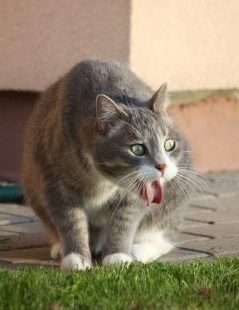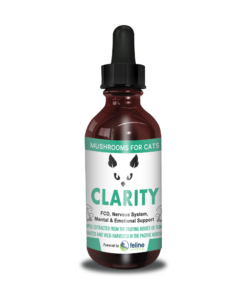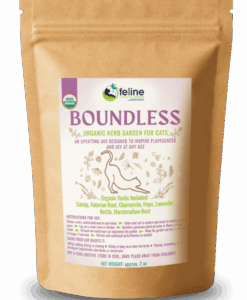We often get asked the question, why is my cat vomiting? Unfortunately there’s not one simple answer to this common question. There are many different reasons cats throw up, so we want to address the problems and solutions here.
Why is my cat vomiting?
1. Poor Quality Diet
Poor quality, rendered diets are one of the most common reasons why cats vomit. Foods that include “by-products” on the ingredient list usually consist of ‘slaughterhouse seconds’ like beaks, feathers, skin, eyes, etc. and these are very difficult for cats to digest. When they are unable to digest the ingredients in their food, they’re likely to vomit. Make sure you’re feeding your cat a food that’s fit for human consumption and doesn’t contain by-products.
2. Gorging and Purging
Does your cat gobble up his/her food quickly? This is what we call “gorging and purging” and will cause cat vomiting. They need the time to chew and digest their food. To remedy this, try putting a large rock in the middle of their feeding dish. This forces them to move around the bowl while they’re eating, and slows down the process.
3. Grain Diets
Cats are not able to digest grains like humans. Just like by-products, grains will get caught in their digestive tract causing your cat to vomit. Make sure that the food you feed your cat says “Grain-free” on the package.
4. Hairballs
Cats will, inevitably, spit up a hairball every now and again. This is because they groom themselves and ingest hair. This form of cat vomiting should not be considered ‘normal’ if done on a regular basis. There are three factors that contribute to excessive hairballs in cats and you can read more about that here.
5. Enzyme Deficiency
To quote Dr. Karen Becker, a proactive and integrative wellness veterinarian, “A cat’s pancreas sometimes doesn’t produce enough lipase, protease, and amylase, which creates a chronic or acute low-grade case of pancreatitis… Adding a digestive enzyme to your cat’s diet is like buying insurance. You may never need it, but it’s always good to have. If Fluffy’s pancreas is properly producing enzymes, adding additional enzymes to the food is not a problem. If on the other hand your pet’s pancreas is not secreting sufficient enzymes, supplementing is a great way to assure she’ll have adequate enzymes to process the meal you’ve just fed her.“
CATalyst is an easy way to supplement the digestive enzymes needed in your cat’s daily diet.
There are more severe reasons that can contribute to cat vomiting, so we recommend that you have a veterinarian test your kitty if the vomiting is a serious problem. If the results come back fine, make sure that you’re following the above steps and that you stick to a routine when feeding your cats. Sticking to the same feeding times each day will also help greatly in reducing the cat vomiting.
Digestive Enzymes for Cats





Recent Comments